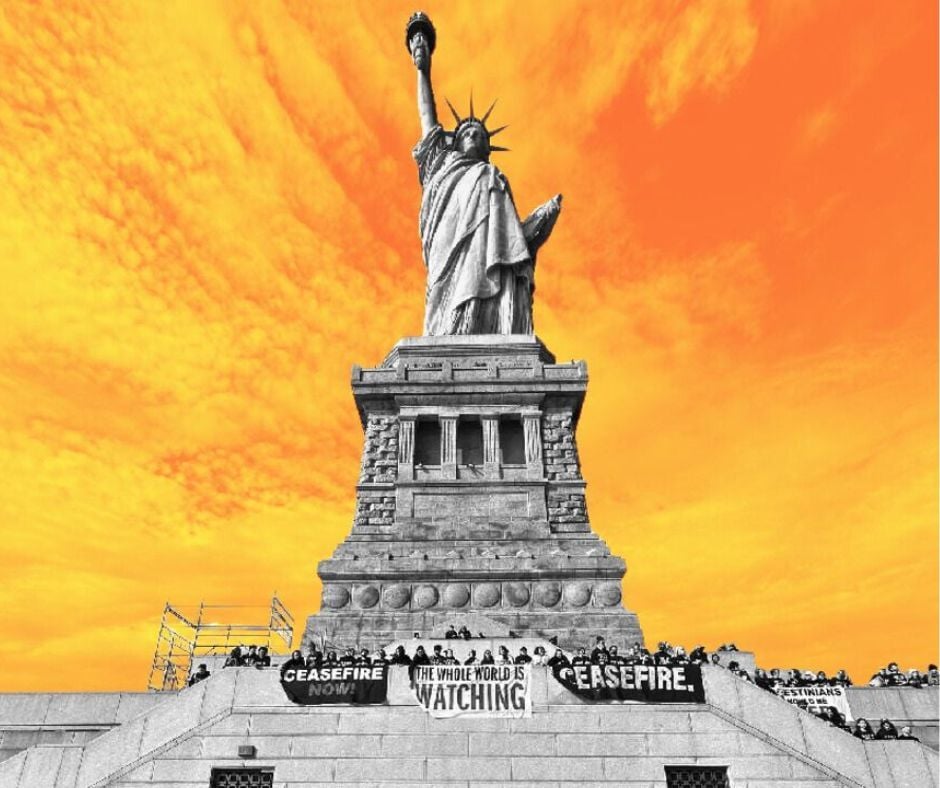It is not easy to function in an emergency and prepare for a long-haul fight at the same time. But right now, all of us committed to peace and justice in Israel-Palestine need to meet that challenge.
What’s more, all those concerned about the threat of racist authoritarianism in the US need to do the same. Staving off white Christian Nationalist rule in 2024 depends on expanding the ground pro-Palestinian forces have gained in electoral politics and shifting sentiment in the Democratic Party our way.
Yes, the Gaza crisis has centered the most fraught division within the coalition arrayed against MAGA at the ballot box. Pro-Palestinian organizing is under fierce assault, and beating MAGA is now more difficult. But all tendencies to retreat to strongholds on the margins of mainstream politics must be rejected. Instead, we need a bold program to defend all the electeds who support a ceasefire, expand their ranks, and press Biden to immediately reverse course or get out of the way.
Top priority: ceasefire and humanitarian aid
Civilians in Gaza are being killed every hour. Water, food, and fuel needed by two million Palestinians could run out any day. The demand that the US government insist on a ceasefire and massive humanitarian aid to Gaza is urgent. Domestic protest and global pressure (“The West Is Losing the Global South over Gaza”) have forced the Biden administration to express concern for Palestinian civilians and put forward the idea of “humanitarian pauses” in Israel’s onslaught. But failure to combine words with any action—specifically saying aid to Israel will be cut off unless Israel changes course —doesn’t change anything on the ground.
The pressure must be upped—more demonstrations and direct action/civil disobedience, more calls and emails flooding congressional offices, more congressional staffers and other “insiders” dissenting in public, and more individuals who have “inside” connections calling in every marker they have.
The ceasefire demand also sets the context for extensive political education work. The action front demanding a ceasefire and humanitarian aid is (and must be) much broader than its anti-Zionist component. But both can be expanded and strengthened at a time when large numbers are open to hearing analyses of the Israel-Palestine conflict—and the US role—that they would have ignored or dismissed just a few weeks ago.
Opening for a truly mass strategy
Support for Palestinian rights and acknowledgement that Israel is an apartheid state has long been a “third rail” in US politics. But under the surface, substantial shifts in sentiment have taken place among younger generations—including younger Jews—and within the base of the Democratic Party.
In the wake of the Hamas assault and Israeli response, the expanded sympathy for Palestine has exploded into mass politics with the ceasefire demand. The huge turnout at the Nov. 4 demonstrations, polling results showing majority support for a ceasefire, and the rebellion among a substantial percentage of the Democratic National Committee staff are unprecedented manifestations of the changed landscape.
A dramatic escalation of McCarthyite attacks on students, professors, elected officials, trade unions, community groups, writers, artists, funders, and others who express pro-Palestine sentiments has been the inevitable result. Such attacks call up the worn canard that opposition to Zionism and Israel’s practice of apartheid is and can only be an expression of hatred of Jews, that is, anti-Semitism. Defense of all those targeted and smeared in this manner is an essential task going forward.
This defense takes place in a new context, however. While there are individuals who retreat or are intimidated by these assaults, they are outnumbered by the people who are finding their voice. And growing numbers say that even though they disagree with the pro-Palestine viewpoint or aspects of it, supporters of Palestine have the right to put their arguments forward. Courage can be contagious and taking the offensive can be effective—witness the outpouring of public protest by writers and 92NY staff after this prestigious cultural institution cancelled a program featuring Pulitzer Prize-winning author Viet Thanh Nguyen.
The bottom line is this: though we are still well behind our opponents in political clout, we are part of a movement that is growing—in fact growing rapidly—not retreating.
The Democratic Party is a key site of battle
A particularly important aspect of the current landscape is the beachhead progressives —and figures who are willing to speak up for Palestine in particular—have established in Congress. Twenty-two House members and one Senator are now on record supporting a ceasefire. In the immediate days ahead, increasing this number is a top priority. Longer term, it is essential to support every one of these (and others who join them) in beating back the primary challenges they will face in 2024 (which will be lavishly funded by AIPAC, foreign policy hawks, and the bloated “defense” industry). Especially if pro-Palestine champions like Rashida Tlaib and Cori Bush are re-elected, momentum to continue the shift among Democrats not only regarding Israel-Palestine but US foreign policy in general can be accelerated.
Deepening this shift is essential because of the current nature of the other major party. Captured by MAGA, the Republican Party is an open, no-apology-whatsoever advocate of Israel committing genocide against the Palestinians. As the political home of both the most die-hard Jewish Zionists and the millions of Christian Zionists who see Israeli domination as a prelude to their soul-saving “rapture,” there is not the slightest sympathy for Palestine in the GOP ranks. To the contrary, the plans of Trump supporters to weaponize the Justice Department under a second Trump presidency would translate into an all-out assault on any and every group advocating Palestinian rights as well as stepped-up repression against Arab American and Muslim communities within the US. Ron DeSantis’ current move to ban Students for Justice in Palestine from Florida institutions is just a glimpse of the McCarthyism-COINTELPRO combination that would anchor the policy of a MAGA-fied Justice Department.
Frustration with—indeed, anger directed toward—the Democratic “establishment” is more than justified. But breaking the bipartisan consensus on support for Israel—which means changing the Democratic Party—is simply a must if US policy toward Israel-Palestine is going to be radically changed.
Push Biden out of the way
Which brings us to Joe Biden. Already he was a weak candidate to top the anti-MAGA ticket in 2024, and his response to the Gaza crisis has been a political blunder as well as a moral catastrophe. With his over-the-top pro-Israel rhetoric and symbolic hug of Benjamin Netanyahu, Biden has made himself the symbol of US backing for the massacre of Palestinian civilians. His current pleas to the Israelis to conduct their slaughter with “humanitarian pauses” (while at the same time sending them weapons) cannot erase that. If he is the Democratic nominee for President in 2024, he will be asking crucial constituencies to make a choice that is agonizing at best: vote for an individual who supported mass murder in order to beat MAGA, or sit out the electoral fight against Trump or some other Republican who advocates genocide but didn’t yet get the opportunity to join in the killing spree.
There is at least the potential for an alternative. We can learn something from a long-shot effort that took place in 1967, when opposition to the Vietnam War was rising but Lyndon Johnson was seemingly secure in his presidency after winning a landslide victory over Barry Goldwater in 1964 and playing an important role in delivering some of the most progressive legislation in US history (the 1964 Civil Rights Act and 1965 Voting Rights Act). A little-known congressperson from New York, Allard Lowenstein, took up a one-man crusade to find another Democrat to challenge Johnson in the 1968 primaries. After being turned down by Robert Kennedy and numerous others, he finally convinced Sen. Eugene McCarthy of Minnesota to throw his hat into the ring.
McCarthy’s effort tapped into the energy of thousands of young people who opposed the war, and his campaign proceeded in tandem with the growth of grassroots non-electoral protests. At the end of January 1968 came the Tet offensive in Vietnam, and though Johnson retained the support of virtually the entire Democratic establishment, McCarthy came close to beating the sitting president in the first Democratic primary (New Hampshire). With McCarthy having pushed open the door, RFK finally got the nerve to enter the race as an opponent of the war. Then, on March 31, 1968—an evening I remember as clearly as I remember last night—Johnson announced that he was withdrawing from the 1968 Presidential race.
The conditions today are ripe for an attempt along those lines—for a candidate who gives Biden credit for beating Trump in 2020 and moving the Democratic Party’s domestic program to the left, but calls for a different approach to Israel-Palestine and foreign policy in general, and explains that this is the route to beating MAGA and starting a new progressive cycle in US politics. That candidate could energize those vital constituencies Biden has alienated—Arab and Muslim voters, young voters and especially young Black and Latinx voters, and peace advocates.
If enough momentum is gained, this kind of effort can widen the small but important cracks that are already visible in the foreign policy establishment regarding US blank-check backing for Israel. That some top officials are beginning to believe this stance harms US global interests is evident in the recent columns of the consummate ruling class mouthpiece Thomas Friedman. In parallel with that, a traction-gaining challenge to Biden could encourage Democratic high-ups to start saying forcefully in public what many of them already think—that Biden is a weak candidate and should consider stepping aside. David Axelrod, Obama’s shrewdest political adviser, just hinted as much in public.
Given the current balance of strength between the Democratic Party’s progressive and centrist wings, it is not likely that a progressive challenger who critiques Biden’s stance on Israel can become the Democratic nominee. But a robust progressive campaign could open the door for a centrist who is not as wedded to blank-check support for Israel and who would have a better chance of getting votes from every corner of the anti-MAGA coalition—including the grassroots communities who powered his 2020 win. And an insurgent candidacy that does decently in Democratic primaries gives progressives more leverage than we currently have.
There’s lot of time between now and the 2024 Democratic Convention in Chicago. And even more time between now and the 2024 election. Turmoil seethes and crises surround us. It would be foolish to try to predict exactly how things may go. But there are patterns in politics that reflect the way different class and social forces organize themselves and struggle to get hold of a piece of governing power.
There is a tide flowing for Palestinian rights. There is also a deep (but at this moment unenthusiastic) well of opposition to Trump and MAGA. The task of the Left is to find ways to mesh those two strands together in both the immediate days ahead and in the year remaining before the 2024 election. An insurgent primary challenge to Biden could be a way to do just that.
On the urgent front: Ceasefire and humanitarian aid to Gaza now!
On keeping today’s momentum for the year ahead: Take Palestine solidarity and anti-MAGA into the mainstream.
Featured image: One month into Israel’s assault on Gaza, hundreds of protestors took over the Statue of Liberty to demand #CeasefireNow. Jewish Voice For Peace-New York anchored the action. Photo courtesy of JVP.
Did you enjoy this article?
We're in the middle of our annual fund drive, and this year we're building our own internal infrastructure for subscriptions, meaning more of every dollar pledged goes to fulfilling our mission. Subscribe today to support our work and be a part of Convergence's next evolution.

